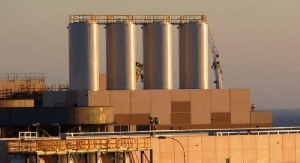 PUWU wants government to probe the role of public officials who negotiated the said agreement
PUWU wants government to probe the role of public officials who negotiated the said agreement
The Public Utility Workers Union (PUWU) has called on government to institute an investigation into the construction of the Teshie Desalination Water Plant.
PUWU in a statement has urged government to probe the role played by public officials who negotiated the said agreement between the Ghana Water Company Limited (GWCL) and Messrs Befessa, to ascertain whether GWCL and Ghana have not been short-changed in the contract.
According to PUWU, the deal stinks, in view of the financial cost to GWCL saying “it appears to be a case of giant conspiracy between foreign investors and their local collaborators and some public officials with political influence to loot the public entity like GWCL, and share the proceeds among themselves under the guise of a private sector investment or private-public partnership.”
Under the agreement, “GWCL is required to pay capacity charge of $1.4million per month to Messrs Befessa. This charge is payable whether the plant is working or not. Again, GWCL is obliged to pay the electricity bills of the desalination plant which stands at an average of GH¢3million per months for (2017). The owners and operators of the plant, which is currently owned by a private investor (Messrs Befassa) are not responsible for the payment of the electricity that is used to enable the plant operate.
“GWCL buys water from the desalination plant for GH¢6.50 per cubic meter and sells it to customers at the PURC-approved tariff of GH¢1.50. Therefore, for every cubic meter of water purchased and sold, GWCL loses GH¢5.00. In addition, GWCL pays the invoiced amount in US dollars even though it sells the Ghana water in cedis, thereby accumulating more losses as a result of exchange differentials.
“Another strange provision in the contract is the price indexation which is tied to local inflation although the invoice and payment to the private operator is in the United States dollars.
“In 2015, GWCL paid to Befessa a total of $1.8million leaving an outstanding indebtedness of $13.9million. In 2016, even though GWCL was making a negative cash flow of about GHS7.2million a month, the company was compelled to pay Befessa a total of $23.7 million leaving an outstanding indebtedness of $8.1milion. As of the end of September 2017, GWCL had paid a total of $12.9 million to Befessa, leaving an outstanding indebtedness of $7.2 million. The company continued to make a net negative cash flow of an average GH¢6.2 million per month.
“These expenditures by the GWCL on the desalination plant under the agreement have left the company in a precarious position affecting its cash flow operations and expansion works. There is no doubt that this agreement between GWCL and Messrs Befessa is not only obnoxious but also beat common business sense.
“The Public Utility Workers Union (PUWU) is calling on government to conduct thorough investigation into the role played by public officials who negotiated this agreement to ascertain whether GWCL and Ghana, as a whole, have not been short-changed by this deal. The union is also calling on the Ministry of Finance, as a matter of urgency, to take appropriate steps to take this albatross hanging around the neck of the company.
“In the light of the fact that this agreement has weakened the capacity of GWCL to deliver on its mandate, PUWU calls on government, which guaranteed the agreement, to take over the financial commitments and transaction losses suffered by GWCL in the purchase and sale of water from the desalination plant, to save the company from potential collapse so that it can continue to deliver potable water to Ghanaians. The current situation where workers feel this arrangement is like "robbing Peter to pay Paul” must stop,” PUWU said.